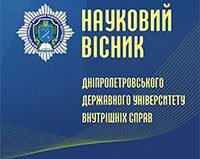Roman OPATSKY
OPATSKY R. (2022), Administrative and legal aspects of establishing paternity: new perspectives, Scientific Bulletin of Dnipropetrovsk State University of Internal Affairs, №4, 157-161
DOI: 10.31733/2078-3566-2022-4-157-161
ABSTRACT. . The article is devoted to the problems of establishing paternity, considering new trends in society and reducing the cost of conducting a DNA examination. As an innovation, it is proposed to introduce a presumption of the consent of both parents for carrying out a genetic examination. The right to refuse one of the parents carries certain negative consequences for him.
In order to solve the problems of establishing paternity, preventing «false paternity» and, as one of the levers, preserving the family, we would like to propose a new mechanism for introduction, which provides, with the written consent of both parents, to carry out a mandatory DNA test to establish paternity in the maternity hospital.
When a husband submits a written refusal to conduct a DNA examination to establish biological paternity, it deprives him of the right to challenge the fact of biological paternity in the future, in case of divorce. The consequence of the refusal will be an unappealable recognition of paternity and the obligation, in the event of such a situation, to pay alimony.
In the case of a woman’s refusal, the right to apply for alimony in the future, in the event of unforeseen circumstances (divorce), will be denied.
The author advocates the importance of such changes that will result: increasing the importance and value of the institution of marriage and family; increasing the level of father’s responsibility for children due to confidence in blood kinship; the introduction of the genetic material collection system in the maternity hospital will eventually lead to the formation of a corresponding full-fledged database. Such an informative base will be useful both to the entire society and to the law enforcement system when identifying the identity of unidentified corpses.
Keywords: child, parents, marriage, family, DNA expertise, paternity.
References
- Rozhon, O. V. (2017) Praktychni aspekty vyznannya batʹkivstva v Ukrayini [Practical aspects of paternity recognition in Ukraine]. Mala entsyklopediya notariusa. Issue 2 (92), pp. 103–112. [in Ukr.].
- Simeynyy kodeks Ukrayiny vid 10.01.2002 [Family Code of Ukraine of January 10, 2002]. URL : http://zakon2.rada.gov.ua/laws/show/2947-14. [in Ukr.].
- Chomu v Ukrayini kozhna druha podruzhnya para rozluchayetʹsya? [Why does every second married couple divorce in Ukraine?] URL : https://www.radiosvoboda.org/a/25016301.html. [in Ukr.].
- Stanovyshche ukrayinsʹkoyi simʺyi: nepovna simʺya, rozluchennya i vyzhyvannya [The state of the Ukrainian family: single family, divorce and survival]. URL : https://slovoproslovo.info/stanovische-ukrainskoi-sim-i-nepovna-sim-ya-rozluchennya-i-vizhivannya [in Ukr.].
- Tsyvilʹnyy kodeks Ukrayiny vid 16.01.2003 [Civil Code of Ukraine: Law of Ukraine dated January 16, 2003]. Vidomosti Verkhovnoyi Rady Ukrayiny. 2003. № 40–44, art. 356. [in Ukr.].
- 6 vrazhayuchykh faktiv pro cholovikiv [6 amazing facts about men]. URL: https://1plus1.ua/novyny/6-vrazaucih-faktiv-pro-colovikiv/. [in Ukr.].
- Konventsiya pro prava dytyny [Convention on the Rights of the Child] : pryynyata 44-yu sesiyeyu Heneralʹnoyi asambleyi OON 20.11.1989, ratyfikovana Postanovoyu Verkhovnoyi Rady
Ukrayinsʹkoyi RSR 27.02.1991. URL : https://zakon.rada.gov.ua/laws/show/789-12#Text. [in Ukr.]. - Opatsʹkyy, R. M. () Formy diyalʹnosti publichnoyi administratsiyi u sferi realizatsiyi yuvenalʹnoyi polityky [Forms of activity of public administration in the field of implementation of juvenile policy]. Porivnyalʹno-analitychne pravo. URL: http://www.pap.in.ua/3-1_2013/7/Opatskyi%20R.M.pdf. [in Ukr.].
- Moroz, V. (2022) Legislative support enforcement of court judgments in Ukraine. Philosophy, Economics And Law Review. Vol. 2, no. 1, pp. 212-220.
